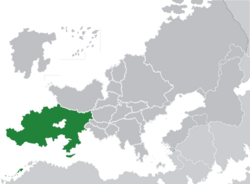Eulabian Union: Difference between revisions
mNo edit summary |
mNo edit summary |
||
| Line 129: | Line 129: | ||
}} | }} | ||
The '''Eulabian Union ''', commonly known as the'''EU''' or simply as '''Eulabia''' was a super-state located in the western part of the [[Eulabia|Eulabian continent]]. It consisted of 6 states, each governed by a President. It was the historical predecessor to the present-day [[Eulabia|Commonwealth of Eulabia]]. It came into existence on 9 May 1958 with the unification of the western eulabian states. The Union came to an end with the enactment of the constitution of 2012, by which it became a unitary semi-presidential republic. | The '''Eulabian Union ''', commonly known as the '''EU''' or simply as '''Eulabia''' was a super-state located in the western part of the [[Eulabia|Eulabian continent]]. It consisted of 6 states, each governed by a President. It was the historical predecessor to the present-day [[Eulabia|Commonwealth of Eulabia]]. It came into existence on 9 May 1958 with the unification of the western eulabian states. The Union came to an end with the enactment of the constitution of 2012, by which it became a unitary semi-presidential republic. | ||
It was considered the wealthiest nation on the continent, with [[Kostanse]] being considered one of the largest financial centres in the world. Nevertheless, Eulabia was plagued by socio-political problems that eventually resulted into the [[Eulabian Civil War]]. Most notable was the disparity in the development of some of the constituent republics. It was said that this inequality allowed various megacorporations to establish oligarchical control over some of the poorest regions and use their seats in the Eulabian Assembly to influence the Union politics. | It was considered the wealthiest nation on the continent, with [[Kostanse]] being considered one of the largest financial centres in the world. Nevertheless, Eulabia was plagued by socio-political problems that eventually resulted into the [[Eulabian Civil War]]. Most notable was the disparity in the development of some of the constituent republics. It was said that this inequality allowed various megacorporations to establish oligarchical control over some of the poorest regions and use their seats in the Eulabian Assembly to influence the Union politics. | ||
Revision as of 20:40, 4 June 2024
This article is incomplete because it is pending further input from participants, or it is a work-in-progress by one author. Please comment on this article's talk page to share your input, comments and questions. Note: To contribute to this article, you may need to seek help from the author(s) of this page. |
Eulabian Union | |||||||
|---|---|---|---|---|---|---|---|
| 1958–2008/2012 | |||||||
|
Flag | |||||||
| Motto: Divided We Fall | |||||||
 Eulabian Union in 2007 | |||||||
| Capital | Kostanse (executive) Lunden (legislative) | ||||||
| Largest | Lunden | ||||||
| Official languages | French, Italian, Dutch, Portugese, Spanish | ||||||
| Demonym(s) | Eulabian | ||||||
| Government | Confederated parliamentary directorial republic | ||||||
| Presidency | |||||||
• 1958-1963 (first) | Alessandro Fileccia Johannes Strauss Pedro Juárez Jeroen De Leener John Mayer | ||||||
• 2014-2016 (last) | Amand Chaucer Laura Segers Lia Fernández Magnus Sternhell Matteo Gemma | ||||||
| President of the Eulabian Executive Council | |||||||
• 1958-1968 (first) | Francois Monnet | ||||||
• 2005-2008 (last) | Illse Beyen | ||||||
| Legislature | Eulabian Parliament | ||||||
| History | |||||||
• Eulabian Defence Community | 1946 | ||||||
• Treaty of Kostanse | 1958 | ||||||
• Coup d'état | 16 August 2008 2008/2012 | ||||||
| Population | |||||||
• 2008 census | 238,387,123 (2nd) | ||||||
| Gini (2008) | high | ||||||
| HDI (2008) | very high | ||||||
| Currency | Eulabian Franc (ED) | ||||||
| Date format | dd/mm/yyyy (AD) | ||||||
| Driving side | right | ||||||
| Calling code | +919 | ||||||
| Internet TLD | .eu | ||||||
| |||||||
The Eulabian Union , commonly known as the EU or simply as Eulabia was a super-state located in the western part of the Eulabian continent. It consisted of 6 states, each governed by a President. It was the historical predecessor to the present-day Commonwealth of Eulabia. It came into existence on 9 May 1958 with the unification of the western eulabian states. The Union came to an end with the enactment of the constitution of 2012, by which it became a unitary semi-presidential republic.
It was considered the wealthiest nation on the continent, with Kostanse being considered one of the largest financial centres in the world. Nevertheless, Eulabia was plagued by socio-political problems that eventually resulted into the Eulabian Civil War. Most notable was the disparity in the development of some of the constituent republics. It was said that this inequality allowed various megacorporations to establish oligarchical control over some of the poorest regions and use their seats in the Eulabian Assembly to influence the Union politics.
The EU was created in the aftermath of the devastating Great War which saw most of the continent ruined.

